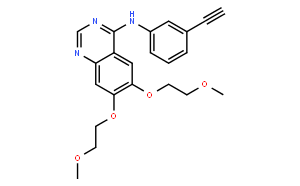
 COA COA |
 MSDS MSDS |
 HPLC HPLC |
 NMR NMR |
| CAS No: | 183321-74-6 |
| Molecular formula(MF) | C22H23N3O4 |
| Molecular Weight(MW): | 393.44 |
| Alias | ERLOTINIB ; ERLOTINIB HCL ; ERLOTINIB HCL SALT ; 4-[(3-ethynylphenyl)amino]-6,7-bis(2-methoxyethoxy)quinazoline ; n-(3-ethynylphenyl)[6,7-bis(2-methoxyethoxy)quinazolin-4-yl]amine; Erlotinib Hydrochloirde ; 4-Quinazolinamine, N-(3-ethynylphenyl)-6,7-bis(2-methoxyethoxy)- ; Tarceva ; ERLOTININ; Erlotinib & its intermediates (Developing) |
| In vitro | DMSO | 78 mg/mL (198.25 mM) |
|---|---|---|
| Ethanol | 15 mg/mL warmed (38.12 mM) | |
| Water | <1 mg/mL | |
| In vivo |
| Description | Erlotinib is an EGFR inhibitor with IC50 of 2 nM, >1000-fold more sensitive for EGFR than human c-Src or v-Abl. | |||||||||||||||||||||||
|---|---|---|---|---|---|---|---|---|---|---|---|---|---|---|---|---|---|---|---|---|---|---|---|---|
| Targets |
|
|||||||||||||||||||||||
| In vitro |
Erlotinib HCl potently inhibits EGFR activation in intact cells including HNS human head and neck tumor cells (IC50 20nM), DiFi human colon cancer cells and MDA MB-468 human breast cancer cells. Erlotinib HCl (1 μM) induces apoptosis in DiFi human colon cancer cells. [1] Erlotinib inhibits growth of a panel of NSCLC cell lines including A549, H322, H3255, H358 H661, H1650, H1975, H1299, H596 with IC50 ranging from 29 nM to >20 μM. [2] Erlotinib HCl(2 μM) significantly inhibits growth of AsPC-1 and BxPC-3 pancreatic cells. [3] The effects of Erlotinib HCl in combination with gemcitabine are considered additive in KRAS-mutated pancreatic cancer cells. Ten micromolar of Erlotinib HCl inhibits EGFR phospho-rylation at the Y845 (Src-dependent phosphorylation) and Y1068 (auto-phosphorylation) sites. [4] Combination with Erlotinib HCl could down-modulate rapamycin-stimulated Akt activity and produces a synergistic effect on cell growth inhibition. [5] |
|||||||||||||||||||||||
| Cell Data |
|
|||||||||||||||||||||||
| In vivo | At doses of 100 mg/kg, Erlotinib HCl completely prevents EGF-induced autophosphorylation of EGFR in human HN5 tumors growing as xenografts in athymic mice and of the hepatic EGFR of the treated mice. [1] Erlotinib HCl (100 mg/Kg) inhibits H460a and A549 tumor models with 71 and 93% inhibition rate. [5] |